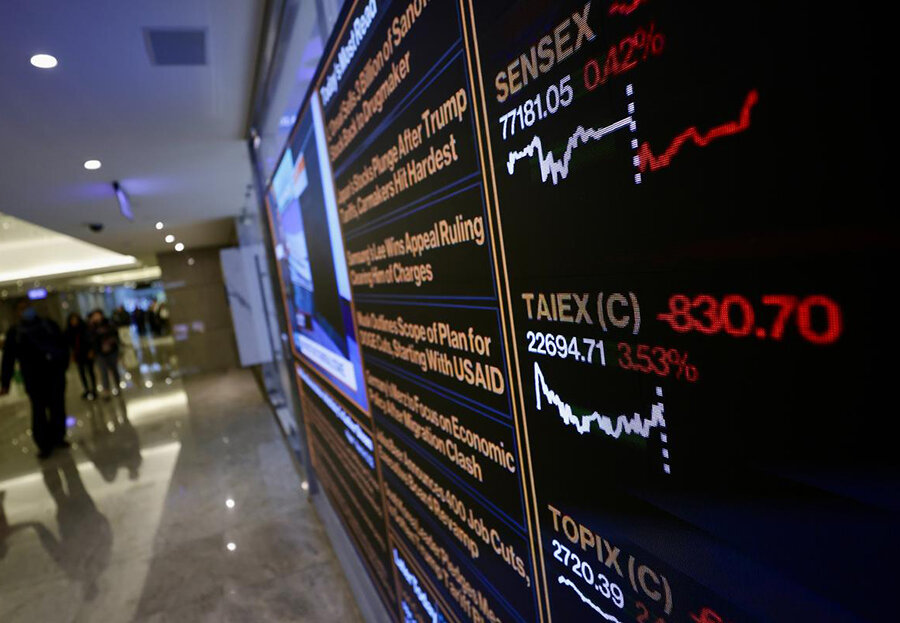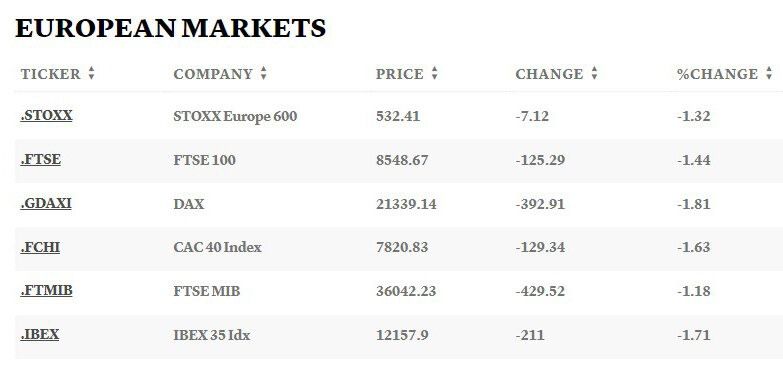The U.S. Starts a Global Trade War: First Tariffs Imposed

Many economists had hoped that U.S. President Donald Trump’s threats to impose tariffs on foreign goods would remain just rhetoric or become part of a bargaining strategy.
Asian and European Stock Markets Plunge
The U.S. imposed 25% tariffs on Canadian and Mexican goods and 10% on Chinese imports. Trump also promised to extend similar tariffs to the European Union in the near future.
On Monday, February 3, the MSCI Asia-Pacific Index fell nearly 3%, marking the biggest intraday drop in six months.
CNBC reports that European tech, industrial, and banking indices all lost more than 2% each. The FTSE 100, the UK’s most prominent stock index, fell 1.26% to 8,562 points, The Guardian writes.
Germany’s DAX opened 2% lower, France’s CAC 40 dropped 1.9%, Spain’s IBEX lost 1.7%, and Italy’s FTSE MIB declined 1.4%.
Trump defended the tariffs, calling the U.S. trade deficit with the EU "a crime", repeating his earlier claims that the bloc had "taken advantage" of the United States.

Photo: CNBC
Countries had braced for the potential consequences of Trump’s tariff threats, but some had hoped for delays or reversals through negotiations. However, analysts warn that corporate revenues will inevitably take a hit, as many economies heavily depend on exports to the U.S.
Automakers Hit Hardest
The automobile industry is already taking heavy losses, as many Japanese, European, and Chinese automakers depend on North America as a key market.
Japanese automakers such as Toyota, Honda, and Nissan saw their shares drop at least 5%.
South Korea’s Kia Corp., which has a plant in Mexico, fell 5.8%.
Chinese EV makers, including Li Auto and XPeng, dropped on the Hong Kong Stock Exchange.
Indian auto part suppliers, such as Samvardhana Motherson, Tata Motors, and Lupin, also saw losses due to their Mexican operations.
Reuters reports that European automakers were also significantly affected:
Stellantis (-6.8%) and Volkswagen (-5.6%) were particularly vulnerable due to their Mexican operations.
Volvo Cars (-6.5%), Mercedes-Benz, BMW (-3.6% to -4.3%), and Porsche (-4.3%) also saw significant declines.
French auto parts supplier Valeo (-7.4%) took a severe hit.
The European Automobiles & Parts Index (.SXAP) dropped 3.7%, sinking below levels seen two weeks prior. The broader STOXX 600 index (.STOXX) declined 1.4%.
Analysts warn that tariffs on Mexican goods could hurt European automakers even more than direct tariffs on EU exports. According to Stifel Investment Bank, the tariffs could cost:
- Volkswagen €8 billion in revenue.
- Stellantis €16 billion, slashing 40% of its operating profit.
Volkswagen has already called for negotiations to prevent a full-scale trade conflict. JPMorgan analysts predict that automakers will pledge new investments and job creation in the U.S. to mitigate the impact.
Other Affected Sectors
Several tech and industrial firms with operations in Mexico were also affected:
Taiwanese AI hardware manufacturers like Quanta Computer (-10%) and Delta Electronics saw declines.
LG Electronics scaled down production in response to tariffs.
Chinese e-commerce platforms, such as JD.com, were hit as Trump revoked a long-standing tariff exemption for shipments under $800.
Chinese consumer goods companies, including Li Ning (sportswear) and Haier Smart Home (appliances), also saw sharp stock declines.
The semiconductor industry faced mixed reactions:
Taiwan Semiconductor Manufacturing Co. (TSMC) and Samsung Electronics cut ties with the U.S. after Trump threatened to impose tariffs on chips.
Meanwhile, Chinese chipmakers like SMIC gained, as investors expect China to accelerate its push for semiconductor self-sufficiency.
Indian chemical producers and Malaysian glove manufacturers actually benefited, as they are expected to gain market share from Chinese competitors affected by tariffs.
What’s Next?
Analysts predict that Asian oil refiners may benefit from U.S. tariffs, as duties on Canadian and Mexican oil could make Asian refiners more competitive.
However, Australian mining giants BHP Group and Rio Tinto dropped in Sydney trading, as concerns grew that lower global demand for metals could result from the trade war.
Meanwhile, governments are already retaliating:
- Mexican President Claudia Sheinbaum vowed to implement countermeasures, rejecting Washington’s claims about crime-related concerns in Mexico.
- China announced it would challenge Trump’s actions at the WTO and introduce countermeasures, Forbes reports.
- Canada’s Prime Minister Justin Trudeau has already imposed $107 billion in counter-tariffs on U.S. goods.
Experts warn that tariffs on Canada, Mexico, and China—the largest U.S. trading partners—could have severe ripple effects, crippling industries from auto manufacturing to consumer goods and energy.
Reuters highlights that many analysts, including in the U.S., view Trump’s actions as strategically dangerous, potentially triggering a full-scale global trade war that could undermine the fragile post-pandemic economic recovery.








